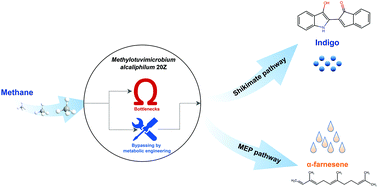Bypassing the bottlenecks in the shikimate and methylerythritol phosphate pathways for enhancing the production of natural products from methane in Methylotuvimicrobium alcaliphilum 20Z†
Abstract
Indole alkaloids and sesquiterpenoids are sub-groups of natural metabolites found in plants that have been widely applied in many aspects of human life. In recent years, metabolically engineered microbes that produce these compounds have become attractive. Methane, the second most abundant greenhouse gas, has emerged as a cheap and promising feed for microbial production of natural products. In this study, we employed metabolic engineering for the first time to produce indigo and α-farnesene (two representatives of alkaloids and sesquiterpenoids) from methane, using Methylotuvimicrobium alcaliphilum 20Z as the host strain. Initially, 1.3 μg L−1 (2.9 μg g-DCW−1) and 42.61 mg L−1 (95.65 mg g-DCW−1) of indigo and α-farnesene, respectively, were produced. Both the shikimate and methylerythritol phosphate (MEP) pathways are multi-step processes with several enzymes under feedback inhibition or rate limitation, resulting in poor indigo and α-farnesene biosynthesis. Using Escherichia coli-originated feedback resistant enzymes to unravel the bottlenecks in the shikimate pathway, the indigo titer was enhanced 2.7-fold to 3.5 μg L−1 (8.7 μg g-DCW−1). Meanwhile, the limitation in the MEP pathway was addressed by employing a ribulose 5-phosphate-interconnecting MEP shortcut route, yielding 48.98 mg L−1 (252.3 mg g-DCW−1) of α-farnesene. Furthermore, xylose was used as a co-substrate to restore the impaired growth of recombinants expressing the bottleneck-bypassing enzymes. As a result, 6.3 μg L−1 of indigo and 91.55 mg L−1 of α-farnesene, which were 4.8-fold and 2.1-fold higher, respectively, than those initially produced, were obtained. This work provides potential approaches to improve natural compound production from renewable carbon sources through the shikimate and MEP pathways in methanotrophic bacteria.



 Please wait while we load your content...
Please wait while we load your content...